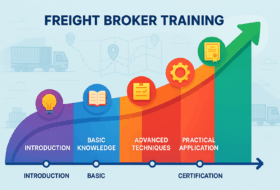Are you looking to land a new position in the dynamic world of freight and logistics? Specifically, perhaps you’re searching for freight broker jobs or aiming to get started as a freight agent with an established company. While starting your own brokerage is an option, many successful professionals in this industry begin their careers by working for someone else to learn the essential skills and ropes. This post, inspired by insights from Freight 360’s video, breaks down effective techniques for finding and applying for these roles, covering various application methods and crucial vetting steps.
Finding Freight Broker Jobs: Job Boards & Company Websites
One of the most straightforward methods for finding freight broker jobs is through online job boards. Platforms like Indeed and Zip Recruiter allow you to upload your resume and search for positions using specific filters such as job title, location, or salary. This provides an excellent overview of what is available both locally and potentially nationwide, especially for remote roles. When searching, be sure to look for common industry job titles, which may include:
- Freight broker
- Logistics account executive
- Logistics coordinator
- Freight dispatcher
- Or simply “dispatcher”
If you are posting your resume online, consider including your desire to work in freight brokerage within the objective statement at the top. Recruiters often review this section first, and stating your interest explicitly can help your resume rank higher in targeted searches for candidates with freight brokerage experience.
W-2 vs. Freight Agent: Navigating Job Board Listings
It’s important to distinguish between positions for W-2 freight brokers and independent freight agents (often 1099 employees) when reviewing job board listings . Typically, W-2 freight brokers work from a company’s office, receive structured training, and earn a salary. These roles are often entry-level opportunities. Freight agents, on the other hand, tend to work remotely from home and are compensated solely on commission . Agent positions usually require some prior experience. Therefore, it is essential to read the full job titles and descriptions carefully to ensure you are applying for roles that align with your situation and experience level.
Researching Opportunities on Company Websites
Beyond general job boards, exploring the websites of freight brokerage companies themselves is a valuable step. Larger companies are particularly likely to have dedicated sections for recruitment, catering to both W-2 employees and independent agents depending on their business model. A company’s website can offer significant insight into its culture, potentially showing pictures of the work environment or office, providing details about their history, and sometimes featuring testimonials from current team members.
When visiting a company’s site, consider how long they have been in business . Companies that have been operating for a decade or longer may offer a more stable environment compared to newer startups, allowing you to feel more in control of your professional future rather than worrying about the company’s longevity. For those interested in W-2 positions, examine the types of jobs they have posted. Do they only list freight broker roles, or are there openings for sales, operations, team leaders, or management?
The variety of positions can indicate potential for upward mobility within the organization. For prospective freight agents, conduct in-depth research into what the company offers. A reputable company should be transparent about their commission structures, the software and technology they provide, and the minimum requirements for new agents, such as necessary experience or the need for a pre-existing book of business. A lack of transparency regarding their agent offering should be considered a significant red flag.
Leveraging Networking to Find Freight Broker Jobs
The traditional method of networking remains highly effective in the freight industry. This includes connecting with people in your social circle, whether through social media or individuals you know in your daily life. You might know someone who owns a freight brokerage or be part of online groups dedicated to the freight community. Business owners and recruiters often share information about job openings and recruitment drives for both W-2 employees and 1099 agents within these networks.
Networking: A Game Changer for New Agents
For individuals new to the industry or seeking to start as an agent but lacking significant experience or a customer base, traditional networking can be particularly beneficial. Many larger agent-based companies often require potential agents to be experienced and have an existing book of business. Networking allows you to bypass some of these standard requirements. Engaging with other brokers and community members might lead to opportunities, even with companies that don’t yet have a formal agent program. You could potentially become the first agent they bring on. This often happens through building connections and demonstrating that you are a highly skilled salesperson with the ability to learn quickly and possess an entrepreneurial spirit.
Crucial Step: Vetting Potential Employers
Regardless of how you find an opportunity, conducting thorough due diligence on potential employers is absolutely critical. Do not hesitate to ask lots of questions during the application and interview process. One of the most insightful steps you can take is to request the opportunity to speak candidly with someone who currently works for the company, whether they are a W-2 employee or an independent agent.
Critical Insight: Remember that not all freight brokerage companies are managed or led equally. Just as they are vetting you as a potential employee or agent, it is equally important for you to vet them to ensure they are a good fit for your career goals and values.
Key Areas to Research When Vetting
Based on the information you can gather from company websites and through networking, focus your vetting process on these areas:
- Company History and Stability: How long have they been in business? (Prefer 10+ years for stability).
- Company Culture: Does the environment seem supportive? Look for testimonials or images that give a sense of the workplace.
- Upward Mobility (for W-2): Are there opportunities for advancement into different roles or management?
- Agent Offering (for Agents): Is the commission structure clear? What software and technology are provided? What are the specific experience or book of business requirements?
- Transparency: Is the company upfront about their expectations and offerings, especially for agents? Lack of transparency is a red flag.
Questions to Consider Asking
While the source doesn’t list specific questions, based on the areas it suggests researching, you might consider asking current employees or hiring managers about:
- The typical day-to-day experience.
- The support and training provided.
- The company’s sales process or agent support structure.
- Challenges and rewards of working there.
- How performance is measured and compensated.
Asking thoughtful questions and seeking candid feedback from current staff will provide a clearer picture of what it’s truly like to work with the organization.
Conclusion
Finding your ideal freight broker jobs requires a strategic approach that goes beyond simply submitting applications. Utilize major job boards and explore company websites to identify opportunities and gather initial information. Leverage your network, both online and offline, as this can open doors, particularly for those new to the agent side. Most importantly, commit to thoroughly vetting each potential employer by researching their history, culture, and specific job offerings, and by asking pertinent questions and seeking insights from current employees. By taking control of your search and applying due diligence, you can increase your chances of landing a position that aligns with your aspirations and sets you on the path to success in the freight industry.
Now that you have these techniques, it’s time to put them into action. Start exploring the possibilities and take the necessary steps to make informed decisions about your next career move in freight brokerage or agency!
FAQ
What are the common job titles to search for when looking for freight broker jobs?
You should look for titles such as freight broker, logistics account executive, logistics coordinator, freight dispatcher, or just dispatcher.
What is the main difference between a W-2 freight broker and a freight agent?
W-2 freight brokers typically work in an office, receive training, and earn a salary, often in entry-level roles. Freight agents usually work remotely, earn commission only, and often require prior experience or a book of business.
Why is it important to research a company’s website when looking for freight broker jobs?
Company websites provide insight into culture, history, work environment, and testimonials. You can see what job types they offer (indicating upward mobility for W-2) and research the specifics of their agent program (commission, software, requirements).
How can networking help someone new find a freight agent opportunity?
Networking can be crucial for newer agents who may not meet the experience requirements of larger companies. Connecting with others in the freight community can lead to opportunities with smaller companies or those just starting agent programs.
Growth + Change = Opportunity! How are you going to capitalize on the opportunity as a freight broker, agent, dispatcher or box truck carrier?
Enroll in a course today and get a Shippers List for free! Use Code: freeship





